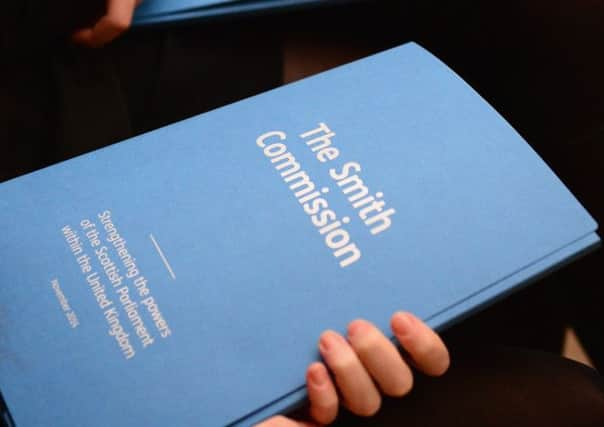Bill Jamieson: Don’t expect a welfare bonanza


‘Scotland? It’s a welfare paradise … free this, free that – and now it’s going to get more!”
It’s a common complaint Down South, laced with grudging references to free tuition fees, free personal care, free bus passes, free bridge tolls, free prescription charges, free eye and ear tests – all these while SNP ministers moan of a Scotland being ground down under the vicious heel of Westminster austerity.
Advertisement
Hide AdAdvertisement
Hide AdThe fracas over “more powers” is likely to see this charge repeated and amplified. The Smith Commission has proposed the transfer of significant new welfare powers for Scotland.
The reality, however, is set to prove markedly more modest than the rhetoric – neither a wholesale transfer of welfare powers nor a welfare spending bonanza.
For an understanding of all this we are indebted, once again, to one of Scotland’s more discreet but brilliant treasures: David Bell, professor of economics at the University of Stirling. A new blog on his website challenges the conventional picture of a wall of welfare cash about to head for Scotland. My greatest worry in what is about to unfold is not so much about which powers will, or will not be transferred to Scotland but the boundless scope for further argument and disputation between the two governments in the post “more powers” world. Far from resolving issues and arriving at a settled outcome, this is set to become a permanent battlefield with the prospect of ever more confusing changes, modifications, fudges and complexity.
Welfare is what the modern British state does. It has become its single most important activity. The welfare state that came into being in the late 1940s was founded on a granite principle that the state would insure British citizens against poverty, unemployment, bereavement, disability and adverse circumstance. Enshrined in this was a commitment to ensure equality of access and provision across the UK. This welfare consensus created an equality of provision that was built upon by successive administrations.
The result has been that the cost of the welfare budget has risen 12-fold in 70 years, from £13.5 billion (4 per cent of UK GDP 1948-49) to more than £165bn (almost 14 per cent of GDP).
FOLLOW US
SCOTSMAN TABLET AND MOBILE APPS
This growth, as Prof Bell points out, has substantially exceeded the rate of growth of the economy. The resulting pressure on other areas of public spending has inevitably led some to question its affordability. Meanwhile, with the onset of devolution came a view that the level of such benefits and their dispensing should be more sensitive to local needs. Older hands, however, feared the founding principles of universality and equality were being put under threat.
What is currently on offer? Last month the UK government published draft proposals for legislation based on the Smith Commission report. These included the transfer of control of £2.6bn-worth of welfare benefits to the Scottish Parliament. The rationale was that this “will give the Scottish Parliament the levers it needs to make and create changes to suit Scottish circumstances, while retaining the strength, stability and economies of scale found in the UK-wide system”.
But how might these new “levers” be used? Any Westminster explanation, says Prof Bell, “would not only cause resentment about interference from the Scottish government, but would also open up the criticism that improved outcomes should be available to all UK citizens, not just Scots.” Meanwhile, the absence of any explanation “makes it difficult to understand why some benefits have been selected for devolution while others have not”.
Advertisement
Hide AdAdvertisement
Hide AdCompared to the totality of welfare spending, the benefits being transferred are dwarfed by those being retained at Westminster. They mainly comprise Attendance Allowance and Disability Living Allowance, together accounting for around £2bn.
All of Attendance Allowance (£489 million) and more than one third of DLA (£515m) are claimed by pensioners. Adding Winter Fuel Payments and over-75s TV licences means that more than half of the spending on the proposed welfare powers for Holyrood will be directed towards pensioners.
The behemoth benefit that will be retained at Westminster is Universal Credit. The rationale is that this credit is closely linked with employment and thus needs to be retained as an instrument in the larger toolbox of fiscal and macroeconomic policy.
Apologists for the current proposals argue that Scotland will also have new powers to create benefits in areas of devolved responsibility. This sounds promising. But it is critically dependent on changes to the Scottish government’s budget dispositions to finance them – not more money from Westminster. After the first year the amount that its budget will increase will be closely linked to changes in spending on these benefits in the rest of Great Britain.
It does not mean, Prof Bell cautions, that there will necessarily be a sufficient uplift in its budget to extend existing benefits to new client groups, to increase levels of support or to introduce new benefits.
That’s the current situation. But even if today’s proposals go through, don’t imagine that the system will then be free of obsessive tinkering in the name of “fairness” and poverty reduction.
Citing these laudable and lofty purposes, Labour from 1999 abolished family credit; introduced working families’ tax credit; introduced the disabled person’s tax credit; introduced a childcare tax credit; introduced an employment credit; abolished the married couple’s tax allowance; introduced the children’s tax credit; introduced a baby tax credit; abolished the working families’ tax credit; abolished the disabled person’s tax credit; abolished the children’s tax credit; abolished the baby tax credit; introduced a child tax credit; abolished the employment credit; and introduced a working tax credit.
Now the Duncan Smith reforms are “bedding in” – for the moment. But not all of this may survive a possible Labour administration in May. As for “benefit-rich Scotland”, a settled devolution of welfare powers with more money to match? The reality will be different but the myth may well endure.